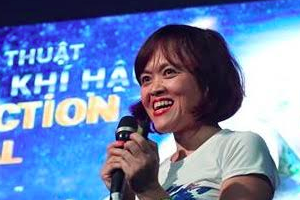
The theme for International Women’s Day 2024 is “Invest in women: accelerate progress” – a fitting theme for a year when a clear plan for funding the global energy transition occupies the top slot on the climate agenda, with the upcoming climate talks in Azerbaijan having been dubbed ‘the finance COP’. It is essential that these negotiations result in a clear roadmap for international investment to finance the energy transition so urgently needed all around the world, but particularly for countries in the Global South.
At this critical juncture in human history, the leadership of women is more important than ever before. Around the world, we have seen inspiring women leaders turn around the African proverb, “if you want to go fast, go alone. If you want to go far, go together”, leading their communities to move fast, and staying the distance to see change come alive.
Hoang Thi Minh Hong is one such woman. A veteran activist whose work over more than 25 years has had an immeasurable impact on environmental outcomes in her home country Viet Nam, as well as within the global climate movement, Hong’s leadership, bravery, and achievements transcend awards or accolades.
Hong was the first Vietnamese person to set foot on Antarctica in 1997, and in 2018, became one of the twelve ‘rising civic leaders’ from twelve nations joining the first cohort of Obama Scholars at Columbia University in New York City, and in 2019, she was recognized by Forbes Vietnam as among the 50 most influential Vietnamese women. Hong is a cherished former 350.org colleague, as she used to be on staff at 350.org before she founded the non-profit organization CHANGE, a youth-led movement which she established after witnessing the impacts of climate change following her second trip to the icy continent twelve years later.
On May 31st, 2023, Hong was arrested in Ho Chi Minh City under false allegations of tax evasion: a common charge weaponized against outspoken environmental activists in the country. She was formally sentenced in September 2023 to three years in prison, joining a now six-strong cohort of environmental defenders serving time in Vietnam as a result of criticizing environmental policy. The unfairness of these arrests has prompted a worldwide solidarity movement: 350.org along with a coalition of partners are demanding the immediate release of all of Viet Nam’s climate defenders.
Hong’s arrest came just months after Viet Nam secured a financing deal aimed at weaning the country off coal dependency and facilitating a transition into a renewables-powered economy – a deal which was brokered on the backs of the invaluable advocacy of people like Hong. The details of the Just Energy Transition Partnership scheme, funded largely by the United States along with a group of international partners, were further unveiled during the UN Climate negotiations in Dubai last December with the release of Viet Nam’s Resource Mobilization Plan.
But transparency concerns around Viet Nam’s JETP deal have been compounded by the clear and disturbing shrinking of democratic space in the country. As public critique of government policy becomes increasingly dangerous, fair and democratic participation in the creation and implementation of policies; accountability; and calls for transparency are proving ever more urgent.
In a 2022 interview, asked about the connections between climate change and gender equality Hong spoke about how women are indeed more vulnerable to climate impacts. Research has repeatedly underlined how women bear a disproportionate share of the impacts felt across an ever-broadening spectrum of accelerating climate burdens – a reality attributable to lingering gender inequalities that continue to plague societies the world over. As primary care-givers and food and fuel providers, women are more likely to be in the direct line of climate-induced disasters like drought and flooding, and make up 80% of the global population that has been displaced by climate change.
However, this is just one side of the coin. The flip side is that women have always shown their readiness to claim agency, and drive change. As Hong said “in Vietnam, women are a lot more active in climate action. In my NGO, at any time, 75 percent of the team are girls. And most of the founders or directors of environmental NGOs in Vietnam I know are women! Women rock! We will save the world!” Asked about how to improve gender equality, Hong quoted G.D. Anderson: “Feminism isn’t about making women stronger. Women are already strong. It’s about changing the way the world perceives that strength”.
Womens’ direct experiences with climate impacts are often referenced as one of the primary factors influencing our suitability to lead the charge against climate chaos, and to adapt to its effects. But the truth is, women possess this capacity not because of these direct experiences, but in spite of them.
Further advancements in areas of gender inequity are essential to advancing the just, equitable, clean future that is the unifying goal of the climate movement. And as we move towards greater equality, we are witnessing women harness and transform historical oppression to fuel our fires. But even more than that, the world is beginning to recognize the strength that was always there. Women’s aptitude for leadership is a central tenet of womanhood itself, and one that every day merits celebration.
Today and every day, join us in celebrating the incredible force that is womanhood, and today in particular, our dear comrade Hoang Thi Minh Hong.
The post Investing in progress: celebrating the leadership of women appeared first on 350.